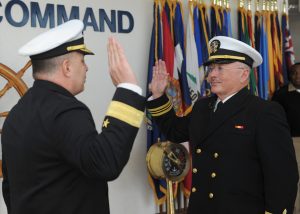
By MC2 Brandon Martin, Navy Recruiting Command
For most people, the idea of a second chance at something will never reach farther than the depths of their own imagination. We often escape to a world full of “what could have been” only to realize that something we wanted to accomplish has long passed us by. For a select few, however, fate smiles fondly upon the dreamer, and that one thing we wanted to accomplish all along suddenly comes back within our reach.
Such is the story of Dr. Charles Wallace, a native of and plastic surgeon in Dallas. After amassing a number of accomplishments and career milestones, Wallace can finally check off one achievement that, at the age of 60, he thought he would never attain.
“My grandfather was cavalry in World War I, my father was Army Air Corps in World War II, and you might say, I missed the boat as far as the Navy is concerned. At the end of the Vietnam War, joining the military didn’t fit into my plan as I was busy getting through pre-med, medical school, and starting my residency. At the time, it just didn’t seem all that attractive to me but here is an opportunity for me to pick up and fulfill that part of my life that I just didn’t do at the usual young age.”
The opportunity Wallace is referring to is part of a new initiative Navy Recruiting Command (NRC) started in order to draw high-quality candidates into a variety of medical programs.
Under the initiative, letters were sent out to medical professions in the Orthopedic Surgeon, General Surgeon, Anesthesiologist, Oral and Maxillofacial Surgeon, and Perioperative Nurse communities calling them to serve in the Navy Reserve and lend their talents to ensure the health and well-being of Sailors and Marines.
“I hadn’t received a recruiting letter in probably 10 to 15 years,” said Wallace. “The letter came in a stack of mail that I received when I returned from a snow skiing trip and as I was sorting through my mail 85 percent of it went straight to the trashcan. But this letter arrived as Mr. Wallace and not ‘Dear Medical Provider, Dear Surgeon, Dear Healthcare Professional,’ or any of the other generic salutations. The letter basically outlined in a very straight forward process what their objectives were, why they were doing this and it appeared to be hand signed by the rear admiral.”
While the letter outlined many of the benefits awarded to someone joining the Navy Reserve such as special pay up to $25,000 per year for board-certified physicians and low-cost insurance options, Wallace was drawn to a much simpler aspect about the initiative.
“Many of my friends have asked me on occasion why I’m doing this,” said Wallace. “My answer remains: the opportunity to both serve the country and extend my career in a different environment for the betterment of our troops and their families. It seemed to me to be an irresistible opportunity.”
Throughout his recruitment, Wallace readily admits he was constantly amazed by the opportunity and personnel involved in the process.
“What surprised me most was that I was being recruited in the first place,” said Wallace. “As I had my 59th birthday less than six weeks before I got the letter, it was a huge surprise that this opportunity and this door would even open. From there, possibly the biggest surprise was the enthusiasm and professionalism of the Navy affiliated personnel who worked with me. That community has reached out to me to welcome me and encourage me to go through the process.”
Following a 27-year career in private practice, the University of Texas Southwestern Medical School graduate stands ready to lend his medical expertise to the Navy and the personnel that will work under him.
“I hope that I can contribute my skills both directly in patient care and in teaching younger, perhaps less experienced, physicians and corpsmen,” said Wallace. “I’ve had the good fortune of having a broad base practice so I hope that I can share that and multiply the effort of that experience by teaching as much as possible.”
Finally done with the recruitment stage, Wallace took the final step in merging his reality and his world of “what could have been” when he became a lieutenant commander in the United States Navy after taking his oath of commissioning in a ceremony held at NRC in Millington, Tenn., on Dec. 19.




